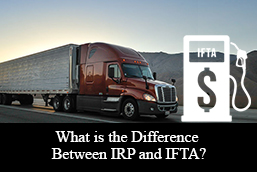 When you’re running a fleet of trucks, delivering goods to various places across North America, it’s incredibly important that all of the registrations, documentation, and licenses are in place so that you won’t have any issues ensuring you can deliver on time. Do you know exactly what each registration is for? Maybe you aren’t sure if you need a specific document for your driver while on the road. If you’re unsure whether your fleet vehicles need an IRP or IFTA here are a few differences so you can determine exactly what you need!
When you’re running a fleet of trucks, delivering goods to various places across North America, it’s incredibly important that all of the registrations, documentation, and licenses are in place so that you won’t have any issues ensuring you can deliver on time. Do you know exactly what each registration is for? Maybe you aren’t sure if you need a specific document for your driver while on the road. If you’re unsure whether your fleet vehicles need an IRP or IFTA here are a few differences so you can determine exactly what you need!
What is an IRP?
IRP, which stands for International Registration Plan, is a reciprocity agreement between Canada and the United States. This plan provides payments and fees to jurisdictions in these two countries based on amount of distance travelled. The idea of this agreement is to promote the fullest use of the highway systems between the two countries.
What are the benefits of an IRP?
If you, as a driver, have an IRP then you can be registered in your home state/province and yet still drive across state lines for delivery. This means you will be able to drive longer distances to deliver goods to various destinations, and you aren’t limited to those destinations with your state or province.
What are the vehicle requirements for an IRP?
If you are driving a commercial vehicle that is intended to be hired to deliver people or goods, with two axles having a gross vehicle weight or a gross combination weight exceeding 12,000KG then you will need an IRP to cross the lines of these two jurisdictions. Further, if your vehicle has 3 or more axles in total you will most certainly need this registration to drive across various jurisdictions and into a foreign country. The only exceptions for vehicles not needing and IRP would be RVs, government-owned vehicles and other privately chartered vehicles.
What is IFTA?
The IFTA is an agreement between Canada and the lower 48 United States, and it stands for the International Fuel Trade Agreement. The purpose of this agreement is to make it easier to report fuel usage if your fleet crosses multiple jurisdictions when delivering goods. Hawaii, Alaska and the northern Canadian provinces are not required to participate in this agreement but in the past Alaska and all of Canada voluntary participates to make everything a little smoother.
What do I do with an IFTA?
Once you are registered for the program, you will be required to display 2 decals showing on each operating vehicle in your fleet. The carrier will also be required to file a quarterly report with the fuel usage for your fleet. From this report, the net tax or possible refund will be determined and then your company will pay accordingly.
There are some exceptions from the IFTA, just like the IRP. In this case, recreational vehicles, pickup trucks with campers attached and buses used exclusively for personal reasons do not need to register for this program.
Both the IRP and IFTA are programs designed to unite Canada and the United States with fleets of trucks delivering goods across the various jurisdictions in these countries. The IFTA, though, was designed to deal with fuel usage while the IRP deals exclusively with highway usage across the borders.


